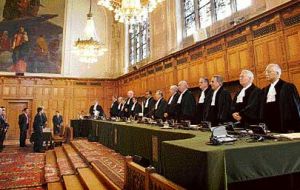MercoPress. South Atlantic News Agency
ICJ turns down Uruguay's request; pickets to continue
 The International Court of Justice
The International Court of Justice The International Court of Justice (ICJ) in The Hague turned down on Tuesday a request by Uruguay to force Argentina to end blockades of roads and bridges linking the neighbouring countries in protest over the construction of a paper mill on the Uruguayan side.
However the Court also called on both parties to "fulfil their obligations under international law, to implement in good faith the consultation and cooperation procedures and to refrain from any actions which might render more difficult the resolution of the present dispute". The ongoing dispute over the construction of the billion plus US dollars Finnish Botnia-Orion pulp mill on the Uruguayan side of the river has become an increasingly bitter litigation with environmental protestors blocking access to Uruguay and Montevideo authorities refusing to dialogue until pickets are lifted. With the advent of the summer season when thousands of Argentines flock to Uruguayan beaches and wanting to prevent a repeat of last year's events, Montevideo appealed to the court last December for provisional measures to force Argentina to end the blockades. "The court by 14 votes to one finds that the circumstances ... are not such as to require the exercise of its power," said Judge Rosalyn Higgins. Uruguay said the demonstrations were strangling its economy and would cost it hundreds of millions of dollars in lost trade and tourism, while Argentina argued the blockades were sporadic and had not affected the new mill's construction. Uruguay formally asked the Court to order Argentina to take "all reasonable and appropriate stepsâ€Ã‚¦to prevent or end the interruption of transit between Uruguay and Argentina, including the blockading of bridges and roads between the two States"; to "abstain from any measure that might aggravate, extend or make more difficult the settlement of this dispute; and finally to abstain "from any other measure that might prejudice the rights of Uruguay in dispute before the Court". According to Uruguay's request "the main bridge between the two States had been subject to a complete and uninterrupted blockade and two other bridges "had at times been closed". Uruguay contended that these roadblocks were aimed at compelling it to halt construction of the Botnia plant and claimed that, by encouraging the roadblocks Argentina "had initiated a trend that is intended to result in irreparable harm to the very substance of the rights in dispute". Uruguay added that, accordingly, "it is the blockades that present the urgent threat, not . . . [the] impact they may eventually have on the Botnia plant". Argentina, on the other hand, maintained that the issue was the blockade of roads in Argentine territory and not of an international bridge. It stated that the roadblocks were "sporadic, partial and geographically localized" and had had no impact on the construction of the pulp mills. It denied having ever encouraged the roadblocks and disputed the irreparable nature of the alleged prejudice. The Court said that "notwithstanding the blockades, the construction of the Botnia plant has progressed significantly since the summer of 2006 and that work continues. It states that it is not convinced that the blockades risk prejudicing irreparably the rights which Uruguay claims from the 1975 Statute and adds that it has not shown that, were there such a risk, it would be imminent. The Court consequently finds that the circumstances of the case are not such as to require the indication of the provisional measure requested by Uruguay (to prevent or end the interruption of transit between the two States and inter alia the blockading of the bridges and roads linking them). Concluding its examination "the Court does not find that there is at present an imminent risk of irreparable prejudice to the rights of Uruguay in dispute before it caused by the blockades of the bridges and roads linking the two States. It therefore considers that the blockades themselves do not justify the indication of provisional measures requested by Uruguay. The case began in May 2006 when Argentina took Uruguay to the International Court of Justice in The Hague accusing it of violating the 1975 River Uruguay bilateral joint administration treaty by not giving enough information on the pulp and adopting unilateral decisions. A judgment on whether Uruguay had breached the 1975 treaty, under which all issues regarding the water of the river must be consulted on and agreed by both countries, is expected within two years, according to the court. Susana Ruiz Cerutti, representing Argentina, said she was happy at the court's decision but noted that it had no implications for the ultimate ruling. Uruguayan Ambassador Hector Gross Espiel who leads the team in The Hague admitted he was "not glad or sad" with the ruling adding that there are positive elements for Uruguay's case, particularly since the ICJ "did not legitimize the blockades". Foreign Affairs minister Reinaldo Gargano said in Montevideo that he was "surprised", but "Uruguay will abide by the ruling". However "we shall wait to see how Argentina reacts, and our stance remains unmoveable: no negotiations with blocked bridges".




Top Comments
Disclaimer & comment rulesCommenting for this story is now closed.
If you have a Facebook account, become a fan and comment on our Facebook Page!